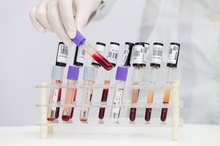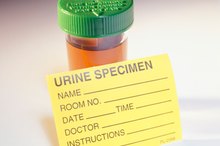What Are the Causes of Elevation in BUN, Creatinine & Glucose?
The body maintains very narrow normal ranges of BUN, creatinine and glucose in the blood. BUN, or blood urea nitrogen, and creatinine form when the body metabolizes protein from foods. Glucose, a sugar, serves as a source of energy for the body and comes from foods that contain carbohydrates. Several conditions cause elevated levels of these substances in the blood.
Diet
Diet plays a role in the levels of BUN, creatinine and glucose in the body. Since BUN and creatinine form during protein metabolism, eating high-protein foods can increase the production of these substances. This results in elevated BUN and creatinine levels. Foods that contain carbohydrates cause blood glucose levels to increase. Some foods cause blood glucose to increase more quickly than others. These foods include non-diet soda, pastries and white bread, according to the University of Sydney.
- Diet plays a role in the levels of BUN, creatinine and glucose in the body.
- Since BUN and creatinine form during protein metabolism, eating high-protein foods can increase the production of these substances.
Kidney Disorders
BUN Vs. Serum Creatinine: Which Is Better for Renal Insufficiency?
Learn More
The National Kidney and Urologic Diseases Information Clearinghouse explains that, when the kidneys function properly, they filter BUN and creatinine out of the blood. After filtering these substances from the circulatory system, the kidneys excrete BUN and creatinine in the urine. When kidney function declines and the kidneys do not filter these substances properly, they accumulate in the blood. This causes increased BUN and creatinine levels. Some people with kidney disease also have diabetes. In these patients, the diabetes causes blood glucose levels to increase.
- The National Kidney and Urologic Diseases Information Clearinghouse explains that, when the kidneys function properly, they filter BUN and creatinine out of the blood.
- After filtering these substances from the circulatory system, the kidneys excrete BUN and creatinine in the urine.
Urinary Obstructions
Urine typically flows from the kidneys to the bladder via the ureters. The bladder holds urine until the nerves signal the bladder muscles to contract and release the stored urine. Urinary obstructions block the flow of urine and cause it to back up into the kidneys. This causes kidney scarring, which could impair renal function. The impaired renal function leads to increased BUN and creatinine levels. Causes of urinary obstruction include kidney stones, blood clots, prostate enlargement, bladder stones, tumors of the urinary tract, urinary tract infections and trauma, according to University of Iowa Hospitals & Clinics.
- Urine typically flows from the kidneys to the bladder via the ureters.
- Urinary obstructions block the flow of urine and cause it to back up into the kidneys.
Medications
Sources of Sucrose Sugar
Learn More
Some medications affect kidney function and blood glucose levels. MedlinePlus reports that corticosteroids, diuretics, epinephrine, lithium, aspirin and tricyclic antidepressants may cause increased blood glucose levels. Diuretics also contribute to increased creatinine levels in the blood, along with ACE inhibitors, ibuprofen, furosemide, naproxen and some antibiotics. A physician may recommend regular blood tests during drug therapy to identify adverse effects before they cause permanent damage.
- Some medications affect kidney function and blood glucose levels.
- Diuretics also contribute to increased creatinine levels in the blood, along with ACE inhibitors, ibuprofen, furosemide, naproxen and some antibiotics.
Infections
Infections increase the amounts of glucose, blood urea nitrogen and creatinine in the blood. Infections put stress on the body, resulting in the increased glucose level. Some infections increase the risk for dehydration, which results in increased BUN and creatinine levels.
Related Articles
References
- University of Sydney: Home of the Glycemic Index
- University of Iowa Hospitals & Clinics: Urinary Obstruction
- MedlinePlus: Glucose Test - Blood
- MedlinePlus: Creatinine - Blood
- Clinical Diagnosis By Laboratory Methods, Todd-Sanford, 15th edition, 1974.
- Note: All normal ranges are dependent on the laboratory and method used for testing
Writer Bio
Leigh Ann Morgan began working as a writer in 2004. She has extensive experience in the business field having served as the manager of a $34 million rental property portfolio. Morgan also appeared as a guest on an episode of National Public Radio's "Marketplace Money" in 2005.









